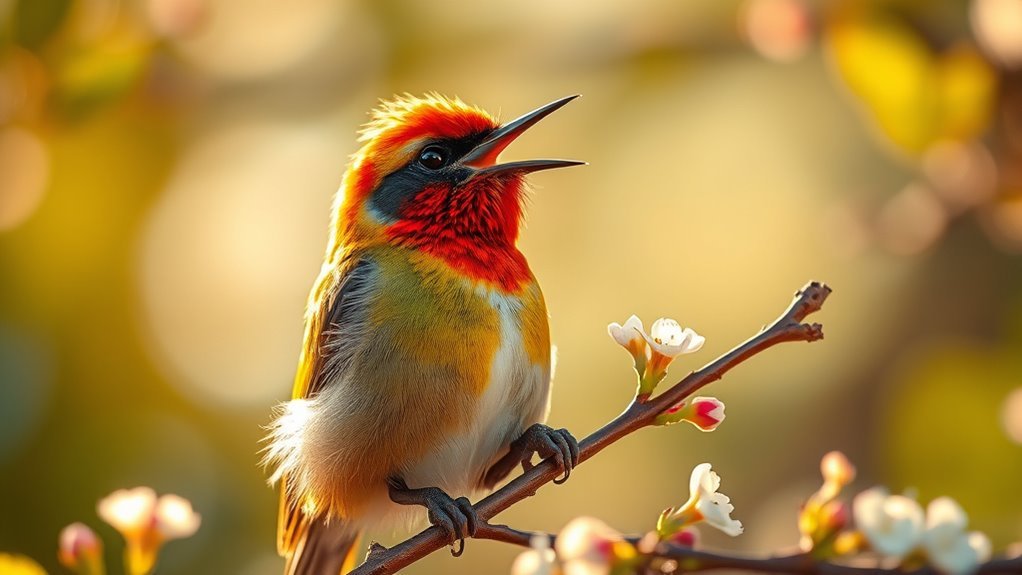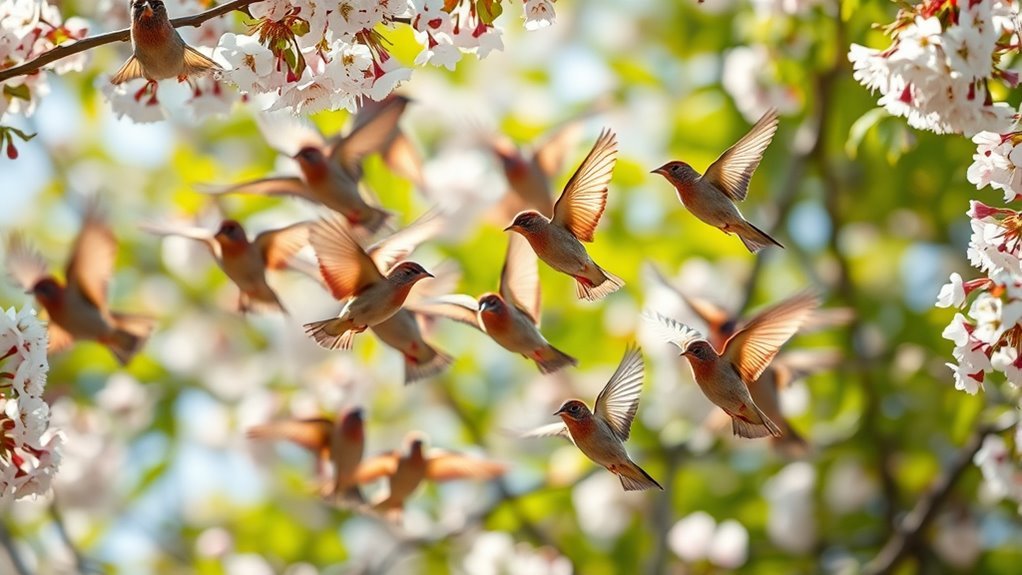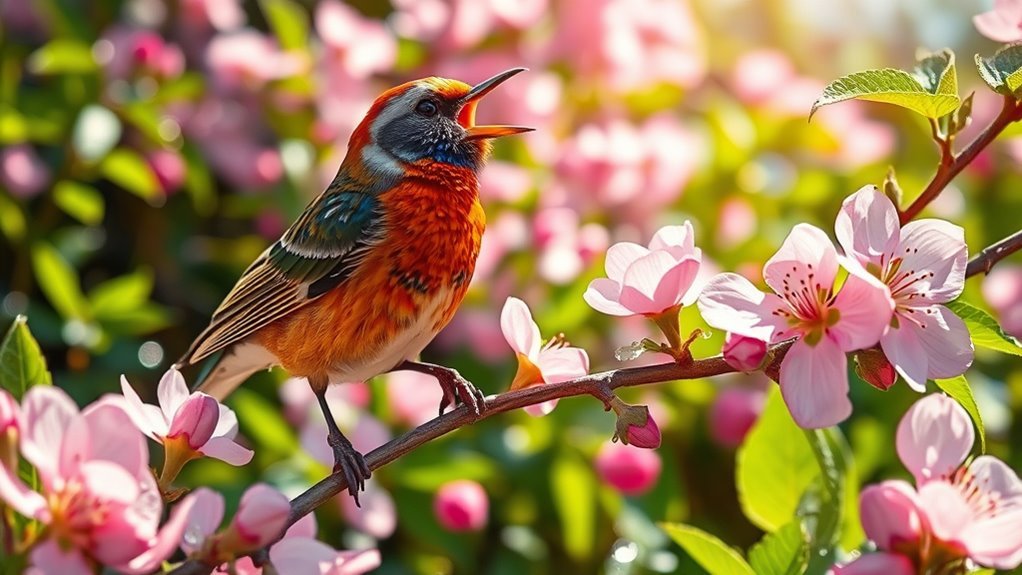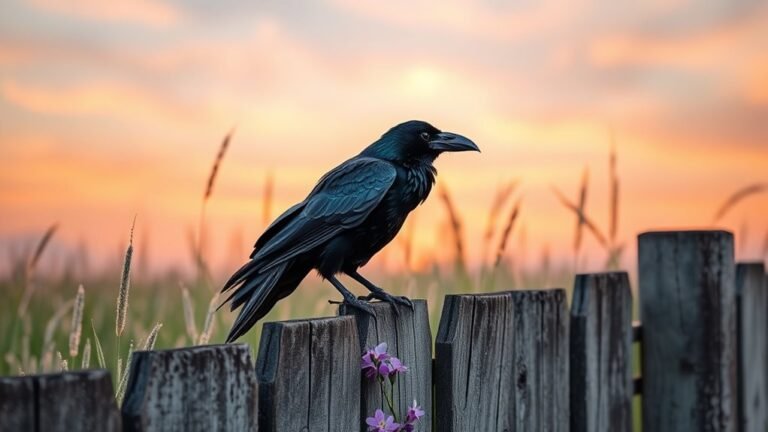Why Are Birds Chirping? Understanding Their Meaning
Birds chirp for important reasons. Their sounds help them attract mates, defend their territory, interact socially, and warn others about predators. Each type of call serves a specific purpose in their daily lives. By understanding these calls, we can learn more about how birds survive and behave. Let's dive into how these vocalizations shape their world.
Key Takeaways
- Birds chirp primarily to attract mates, showcasing their strength and genetic fitness through complex songs.
- Vocalizations serve to establish and defend territory, warning intruders away from their claimed space.
- Chirps facilitate social bonding within flocks, helping to coordinate movements and communicate presence.
- Alarm calls alert fellow birds to potential threats, enhancing safety through communal awareness and coordinated responses.
- Environmental factors, like urban noise or seasonal changes, influence chirping patterns and adapt their communication strategies accordingly.
The Role of Birdsong in Mating Rituals

Birdsong is crucial in mating rituals. Many bird species use their calls to attract mates. Males often sing complex songs to show their strength and quality.
They may copy sounds from nature or other birds to impress potential partners and stand out from rivals. This ability to mimic communicates a male's adaptability and intelligence. Successful singers usually have a wide range of songs, which makes them more appealing.
The mix of melodic patterns and different tones not only attracts mates but also strengthens social bonds. This connection increases the chances of mating success and promotes genetic diversity.
Establishing and Defending Territory
Establishing and defending territory is vital for birds. They've various methods to claim and protect their space.
Here are some common behaviors they display:
- Singing: Birds sing loud and distinct songs to warn others away.
- Visual Displays: They may fluff their feathers or fly in specific patterns to show strength.
- Nesting: Birds choose good locations for their nests to keep themselves and their young safe.
- Confrontations: They'll fight off intruders to maintain their territory.
Understanding these behaviors helps us appreciate how birds secure their homes and attract mates.
Communicating With the Flock

Birds use various sounds to communicate within their flocks. These vocalizations help them bond socially and maintain connections.
When birds call out, they signal their presence, which keeps the group together as they move. These sounds also play a role in flock behavior; certain calls can tell others when to change direction or alert them to nearby food sources.
This vocal communication improves group coordination and helps birds stay together in their environment.
As you watch them, you'll see how their calls show individual identity while also creating unity, highlighting the strong connections in bird communities.
Warning Signals and Alarm Calls
Warning signals and alarm calls play an important role in bird communication. These calls warn other birds of potential threats, which helps them stay aware of dangers.
Here are key points about these vocalizations:
- Type of threat: Different sounds alert birds to specific dangers, such as aerial predators or threats from the ground.
- Distance of danger: The strength and frequency of alarm calls often indicate how close the predator is.
- Species-specific calls: Each bird species may have unique alarm calls that suit their surroundings.
- Flock response: These calls prompt immediate reactions from the flock, promoting safety in numbers.
The Influence of the Environment on Bird Calls

Bird calls serve as a way for birds to communicate and respond to their surroundings. The environment greatly influences these sounds. Changes in habitat, such as urbanization or deforestation, can modify the acoustic landscape. As a result, birds must adapt their calls to communicate effectively.
For example, in noisy cities, birds may raise their vocal pitch to stand out against human sounds. Seasonal changes also affect bird calls. During mating season, males often sing more complex songs to attract mates.
These adaptations show how bird calls are linked to their environment, helping them thrive and convey their messages effectively.
Frequently Asked Questions
Do All Birds Chirp, or Only Specific Species?
Not all birds chirp. Only certain species produce chirping sounds. These birds use their vocalizations to communicate. They convey messages about territory, mating, and social interaction. This ability shows how adaptable they are. Each species has unique traits that help them survive in different environments.
Can Bird Chirping Be a Sign of Distress?
Bird chirping can signal distress. When birds chirp at high pitches or unusual frequencies, they often express fear or alarm. This behavior helps them alert other birds nearby or warn of potential predators. Recognizing these sounds can enhance your understanding of bird behavior and their environment.
How Does Time of Day Affect Bird Chirping?
Time of day has a significant effect on bird chirping. In the morning, many bird species sing loudly to mark their territory and attract mates. This lively morning chorus fills the air with various calls. In the evening, their songs become softer. This change signals that it is time to rest and promotes social bonding among the birds. The variation in their singing patterns reflects their daily activities and needs.
Do Urban Environments Change Bird Chirping Patterns?
Urban environments change bird chirping patterns. Increased noise in cities requires birds to adapt. Some birds chirp louder, while others change their frequencies. These changes show how birds adjust to urban life challenges. This resilience highlights their ability to thrive in different settings. You may notice these variations in chirping when you walk through a city park.
Can Humans Mimic Bird Calls Effectively?
You can mimic bird calls effectively with practice. Focus on mastering specific techniques for different calls. Understand the pitch and rhythm to improve your skills. With time and effort, you can enjoy connecting with nature's sounds.

Hello, I’m Emily Price, the founder of Birds Affection. As a passionate bird enthusiast and spiritual seeker, I’ve always been fascinated by the symbolic meanings and mystical connections between birds and our lives. On this website, I share my knowledge and insights on the spiritual significance of various bird species, exploring their roles as messengers, guides, and teachers. Through my writing, I aim to inspire and educate others on the profound wisdom and beauty that birds bring to our world. Join me on this journey as we delve into the enchanting realm of bird symbolism and discover the hidden meanings behind these magnificent creatures.







